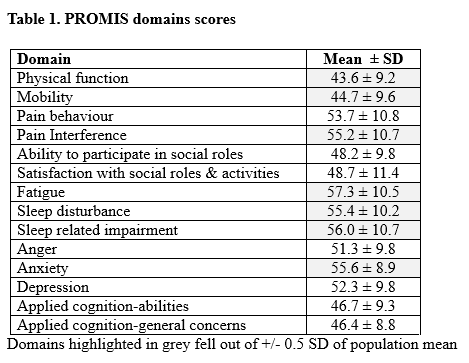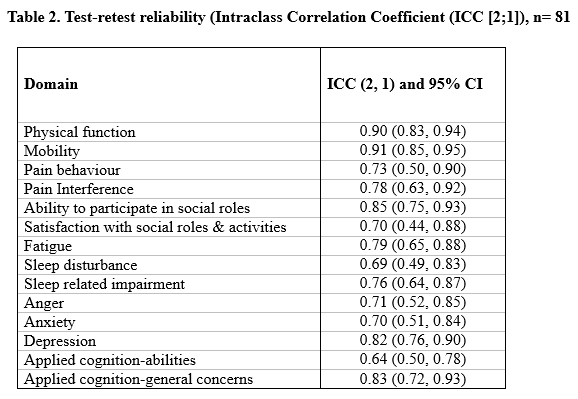Session Information
Session Type: Poster Session (Tuesday)
Session Time: 9:00AM-11:00AM
Background/Purpose: Patient-reported outcome measures are invaluable tools in clinical practice and are central in providing patient-centered care. There has been minimal research on the use of the Patient Reported Outcomes Measurement Information System (PROMIS) computerized adaptive test (CAT) in adults with systemic lupus erythematous (SLE). The present study aims to examine the construct validity and test-retest reliability of the PROMIS CAT in a Canadian cohort of patients with adult SLE.
Methods: All consecutive adult (≥18 years) patients with SLE visiting a Canadian Lupus Clinic between July-September 2018 were approached to participate. Patients completed PROMIS CAT during their clinical visit assessing 14 domains of health: physical function, mobility, pain behaviour, pain interference, ability to participate in social roles, satisfaction with social roles and activities, fatigue, sleep disturbance, sleep-related impairment, applied cognition-abilities, applied cognition-general concerns, anger, anxiety, and depression. Construct validity (using Spearman correlation, r) of PROMIS CAT scales was evaluated against commonly-used legacy instruments: SF-36, LupusQoL, the Perceived Deficits Questionnaire (PDQ-20), Beck Depression Scale – 2nd edition (BDI-II), Beck Anxiety Inventory (BAI), the Assessment of Chronic Illness Therapy Fatigue Scale (FACIT), and the Epworth Sleepiness Scale. Test-retest reliability (intraclass correlation coefficient (ICC [2;1]) was evaluated using baseline data and PROMIS CAT scores 7-10 days after baseline.
Results: : 182 patients (91.2% females) with a mean age of 49.0± 14.1 years and mean disease duration of 18.5 ±12.2 years were enrolled. Table 1 demonstrates the PROMIS sample mean with the population mean of 50±10 as reference. Half of domains’ scores appeared to be within + /- 0.5 Standard Deviation (SD) of the population mean while Physical function and Mobility fell below 0.5 SD and Pain Interference, Fatigue, Sleep disturbance, Sleep related impairment, and Anxiety fell above 0.5 SD. Moderate-high correlations (r= 0.59-0.87) between PROMIS scores and relevant legacy instruments were demonstrated confirming a priori hypotheses regarding construct validity of the PROMIS CAT scales [e.g. r=0.85 for SF-36 Physical Functioning and PROMIS Physical Functioning; r=0.82 for FACIT-F and PROMIS Fatigue]. In 81 patients, good test-retest agreement was found for the majority of domains [ICC (2;1) range 0.64-0.93] (table 2). The lowest ICCs [2;1] were identified for applied cognitive abilities (ICC 0.64, 95% CI:0.50-0.78) and sleep disturbance (ICC 0.69, 95% CI:0.49-0.83).
Conclusion: This is the first study to examine the construct validity and the reliability of PROMIS CAT in a Canadian adult SLE cohort. Compared to legacy instruments (such as SF-36), PROMIS CAT has moderate-high correlation confirming its construct validity and good-excellent reliability. Considering the increasing use of the PROMIS across different health diagnoses, the PROMIS may be a promising non-diagnostic instrument to enhance SLE research and clinical practice.
To cite this abstract in AMA style:
Moazzami M, Engel L, Anderson N, Su J, Bonilla D, Akhavan P, Katz P, Beaton D, Touma Z. Validity and Reliability of Patient Reported Outcomes Measurement Information System (PROMIS) Computerized Adaptive Tests (CAT) in a Canadian Cohort of Patients with Systemic Lupus Erythematosus [abstract]. Arthritis Rheumatol. 2019; 71 (suppl 10). https://acrabstracts.org/abstract/validity-and-reliability-of-patient-reported-outcomes-measurement-information-system-promis-computerized-adaptive-tests-cat-in-a-canadian-cohort-of-patients-with-systemic-lupus-erythematosus/. Accessed .« Back to 2019 ACR/ARP Annual Meeting
ACR Meeting Abstracts - https://acrabstracts.org/abstract/validity-and-reliability-of-patient-reported-outcomes-measurement-information-system-promis-computerized-adaptive-tests-cat-in-a-canadian-cohort-of-patients-with-systemic-lupus-erythematosus/


